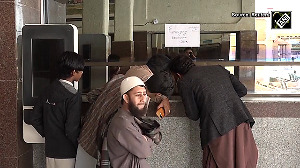Faced with a "troika of problems" -- surplus liquidity, a decline in in credit offtake, and lack of lucrative investment avenues -- banks are now being forced to offer loans at below prime lending rates (7-8 per cent) to even companies that have ratings a notch or two lower ('AA' and 'A').
Bankers complain that no fresh capacities are being added by corporate India and 'AAA' rated corporates are no longer drawing loans from them.
Blue-chip companies are accessing funds directly from the market and through the external commercial borrowings route.
Further, some companies are actually retiring debt because of internal efficiencies arising out of superior funds management.
In such a scenario, banks are willing to take the risk of exposure to 'AA' and 'A' rated corporates with a good debt servicing record.
"Banks have been moving down the rating scale for better yields. They are, however, very selective in lending to these corporates, depending on the comfort level. Average interest rates on loans to these corporates are around 10-11 per cent. They are lagging behind in the level of refinance," said ICICI Bank's Joint General Manager Shilpa Kumar.
She added that most of these corporates first tap short- term money from the commercial paper market before accessing the longer term money market.
In some cases, ICICI Bank has also offered a letter of credit to lower-rated companies when they hit the market and this enables them to get better rates.
As there is no noticeable credit pick-up, banks have hit Bond Street, making investments amounting to Rs 70,980 crore (Rs 709.80 billion) in April 1-August 22, the latest date for which data is available from the Reserve Bank of India (Rs 62,897 crore in the same period last year).
"Deposits with banks have gone up. No new projects are coming up. Companies are managing their funds more aggressively. Banks are left competing with one another for the same piece of cake. Smaller companies have also started negotiating with banks. The demand is coming from 'AA' and 'A' corporates.
"The banks have to manage the risk or keep the funds with themselves," said IndusInd Bank's chief credit officer and executive vice-president CV Bijlani.
"Currently, a 10-year gilt returns about 5.25-5.30 per cent. So, instead of deploying funds in the gilts market, banks are better off taking exposure to good but lower rated corporates," he added.
While a 'AAA' rated corporate can negotiate a short-term loan at 5-6 per cent, 'AA' and 'A' rated corporates can wrangle such loans at 50 to 100 basis points above rate for the best rated corporate," said a senior banker who is clued in to the development.
Cashing in
- Surplus liquidity, decline in credit offtake, and lack of lucrative investment avenues seen as triggers
- Banks offer loans below prime lending rates
- AAA-rated corporates are accessing funds directly from the market and ECBs






 © 2025
© 2025